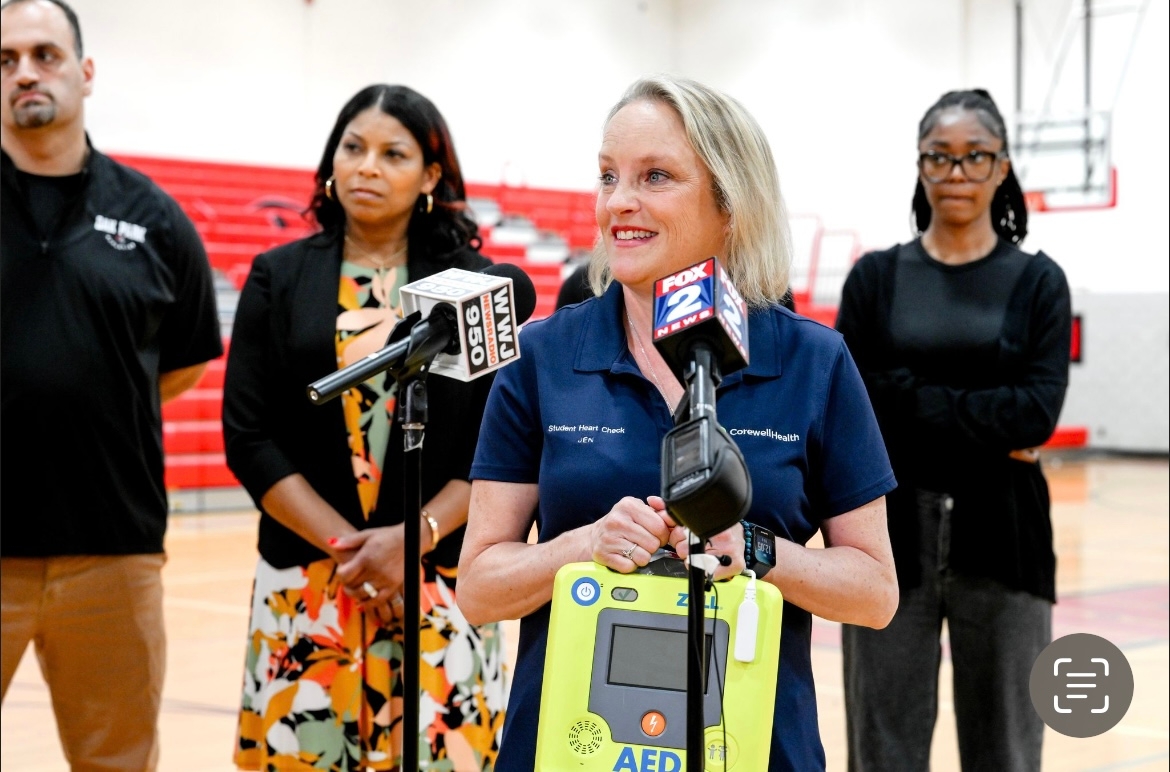High School Students Help Save Teacher Who Experienced Sudden Cardiac Arrest
May 16, 2024
During a student-teacher basketball game March 22, beloved Oak Park Schools coach and physical education teacher, Al Kattola, collapsed due to sudden cardiac arrest.
Within seconds, Isreal DuBose, a 17-year-old Oak Park student, assessed the situation and initiated the chain of survival with the help of Oak Park staff. The chain of survival begins with calling 911, providing early CPR followed by rapid defibrillation.

“Until something happens, you don’t know how you’ll react,” said DuBose, who also works as a patient transporter at Corewell Health in Royal Oak and plans to study nursing, followed by general surgery. “I’m so proud and grateful I was able to be there, act quickly and start delivering compressions right away."
Meanwhile, staff called 911 and arranged for team members to intercept EMS and escort them to the scene. A group that included a second student, Corey Coleman, retrieved the AED and rushed it to Kattola’s side.
His shirt was removed, the AED censors were applied and auditory instructions that accompany the device guided the team in using the AED, which is needed to shock the heart into returning to its normal, healthy rhythm.
DuBose and Coleman learned how to perform CPR and initiate the chain of survival in a health sciences class provided by Oakland Schools just last December.
Assistant Principal Rona Glenn was part of the group who contributed to the rescue, calling 911 and assisting with AED retrieval.
“I will never forget returning to the gym and seeing Isreal giving compressions like no other,” Glenn said. “She and our entire team were a force; brave, confident and on-point, not once stopping to think about what we needed to do. We acted and followed through, determined to achieve signs of life in our beloved staff member.”
CPR, which includes chest compressions, often combined with mouth-to-mouth ventilation, restores blood circulation and breathing in a person who is unresponsive. CPR administered immediately following cardiac arrest can double or triple a person’s chance of survival.
This critical combination – CPR paired with AED technology – saves lives 40% of the time.
Survival rates for those who experience sudden cardiac arrest decline by 7-10% for each minute defibrillation is delayed, according to the American Heart Association.
“As a kid, I was torn from my village at the age of seven. My entire life, I’ve longed for that same feeling of belonging,” Kattola said. “I realize, all these years later, the kids and my colleagues are my village. The village of Oak Pak High School has been my life for 25 years. And now, it has given me my life back through the miracle of love.”
Until recently, Michigan law did not require schools to provide AEDs. But in 2022, Oak Park Schools proactively arranged to work with Corewell Health Children’s Student Heart Check program to obtain six additional AEDs and create response plans for each school.
“It was an honor to work with the team at Oak Park to help prepare them for a cardiac arrest on campus by providing vital AEDs, teaching staff CPR/AED courses and creating a cardiac emergency response plan,” said Jen Shea, manager, Corewell Health Children’s Student Heart Check. “Hearing that the efforts of so many resulted in a teacher being saved is the best news. It goes to show how important being prepared is and that you never know who might need help. I’m very proud of everyone involved.”
Corewell Health Children’s Student Heart Check has donated 79 AEDS to schools throughout the state. It also helps schools create a cardiac response plan and makes certain appropriate staff know where their AED is located and how to use it.
Each year, students die from sudden cardiac arrest due to abnormal heart structure or abnormal rhythms. To help identify these risks, Corewell Health Children’s Student Heart Check offers free student heart checks at high schools throughout the area to individuals age 13-18. Screening offerings, which include a physical examination; blood pressure check; electrocardiogram, or ECG; echocardiogram, quick look, go beyond what is provided in a routine sports physical.

